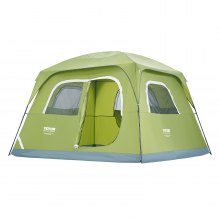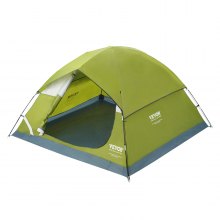Beyond Shelter: VEVOR Exploring Camping Tents as Portals to Nature
The fast-paced nature of the world has made humans seek nature more. As humans increasingly seek solace and connection with the natural world, camping emerges as an essential avenue for rejuvenation and adventure. Beyond the adventures, camping represents an opportunity to immerse oneself in the untamed beauty of nature.
Among the essential gear for any camping excursion, the humble tent stands as a gateway, a portal through which adventurers enter the realm of wilderness. Camping tents transcends their practical purposes. Instead, they are conduits for unforgettable and relaxing experiences. As such, VEVOR continually ensures innovative contributions to the field.
Who Uses Camping Tents?
Camping tents are versatile, making them useful for different individuals. From all age groups to geographical locations and various activities, camping tents are all-inclusive.
Solo Travelers
Solo travelers, including backpackers and solo travelers, often rely on camping tents as the primary accommodation for extended trips.
Tents provide solo travelers with independence, flexibility, and autonomy when exploring remote locations and their quest for discovery.
Outdoor Event Attendees
Individuals traveling to outdoor festivals, concerts, or sporting events often choose to stay overnight in camping tents instead of traditional lodging.
Tents provide event attendees with convenient accommodations close to the venue meeting, giving participants a sense of community and camaraderie.
Budget Travelers
Budget travelers and backpackers appreciate the affordability and convenience of tent camping as a cost-effective alternative to hotels or rental accommodations. Tents for low-income travelers can stretch their travel budgets significantly as they enjoy immersive outdoor experiences in natural settings.
Different Materials Of Camping Tents
Camping tents are made from various materials. Most are made from a combination of these materials, each serving different purposes.
Understanding these materials and their functionalities can help you choose the best camping tent.
Mesh
Mesh panels are incorporated into tent construction to provide ventilation and insect protection without compromising visibility and natural light.
Mesh materials are usually made of polyester and nylon and have micro openings to prevent insects from entering the tent. Mesh panels are commonly found in tent doors, windows, and roof vents to increase comfort and ventilation in hot weather.
Aluminum is widely used in tent poles and tent frames due to its light weight, strength, and corrosion resistance. Aluminum tent poles are durable yet flexible, making them easy to install, stable, and windproof.
Aluminum frames are lightweight and strong, allowing them to be properly anchored in various environments, including rocky or difficult terrains.
Canvas
Canvas has a long history in camping and outdoor recreation. They are valued for their durability, breathability, and natural appearance. Traditional canvas tents are usually made of cotton or a blend of cotton and polyester, which provide excellent insulation and waterproofing.
Camping Tent Pitching Tips and Tricks for All Conditions
Whether camping in calm weather or facing challenging terrain, proper tent setup is essential for maximizing comfort and minimizing potential hazards during the adventure. Follow these tips to ensure your tent stands properly, regardless of condition.
Stake Down the Corners
Put the corners of the tent down and start setting up the ship. Tilt the tent poles at a 45-degree angle and ensure they are securely anchored into the ground to prevent the tent from shifting or rising in strong winds.
Secure the Rainfly
Place rainflies on the tent to protect it from rain, wind, and UV exposure. Ensure the rain fly is properly aligned and securely attached to the tent's body using the supplied clamps, Velcro tabs, or clips.
Utilize Guy Lines
Attach guy lines at the corners of the camping tent for stability and prevent them from rolling in windy conditions. Lay guy lines at 45 degrees to the tent and even tension to reinforce the stress distribution system.
Why Choose VEVOR Camping Tents?
VEVOR, a pioneering brand in outdoor equipment, has redefined the conventional notion of camping tents, elevating them from mere shelters to immersive experiences. Through innovative design, durable materials, and a commitment to functionality, VEVOR tents embody the essence of adventure, beckoning enthusiasts to explore beyond their comfort zones.
Our diverse range of products enables outdoor lovers to explore different terrains and weathers without exposing themselves to the danger of harsh weather. We meticulously craft our tents to harmonize with the landscapes, blending seamlessly with nature without compromising your comfort and protection.
VEVOR’s commitment to the environment is not in question with these tents. We use eco-friendly and sustainable materials, minimizing ecological footprints and ensuring we preserve the outdoors we want you to explore with our tents. These tents are easy to set up, so you do not need to worry about taking too much of your exploration time on them.
FAQs About Camping Tents
Can I use a camping tent for winter camping?
Consider seasons, weather, and expected weather when choosing a tent for a particular climate. Three-season tents are suitable for mild weather, while four are designed for harsh environments such as snow, wind, and extreme heat.
Check for reinforced columns, waterproof materials, and adequate ventilation to ensure the tent is suitable for the intended climate
How do I prevent condensation inside my tent?
Condensation can occur when warm, moist air inside the tent comes into contact with a cool surface. Ensure good ventilation by leaving windows, vents, and doors partially open to allow airflow to reduce condensation.
Avoid cooking inside the tent, as cooking can release moisture into the air. In addition, consider using a tent with breathable fabrics and adjustable ventilation to increase ventilation and reduce humidity.
How do I choose the right tent for the weather conditions?
Some tents are suitable for winter camping, while others do not offer adequate insulation or protection from snow, wind, and cold. Look for four-season tents specially designed for winter, with durable materials, compressed wood, and snow blankets.





















































